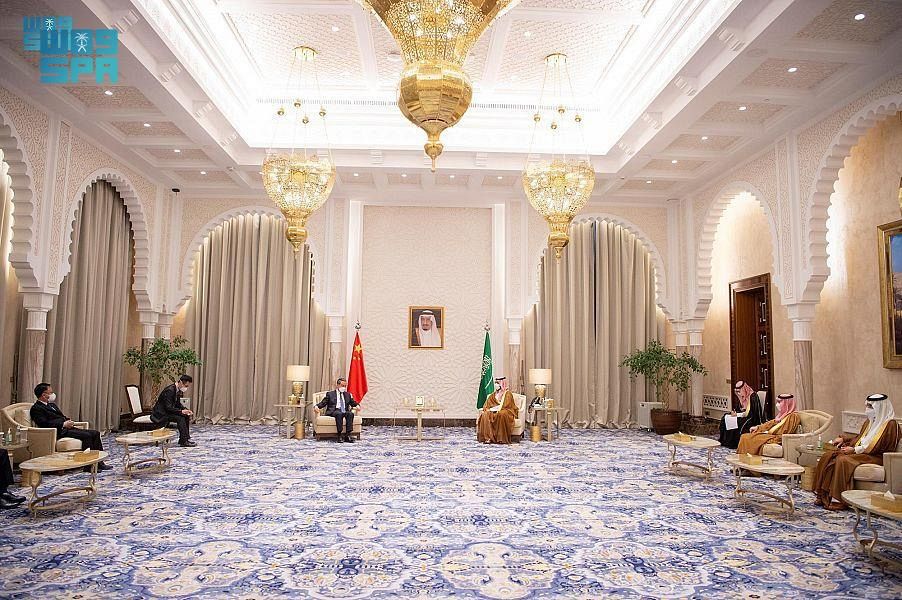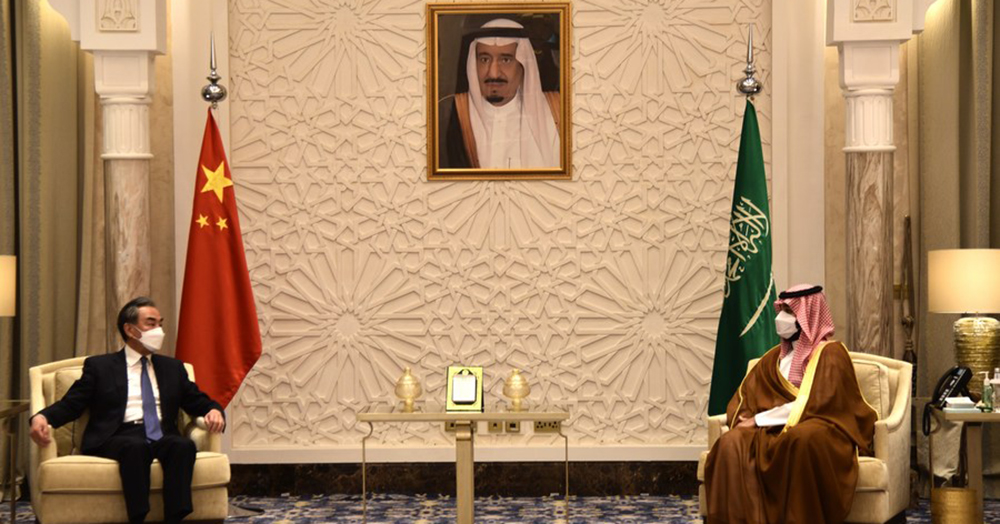The Crown Prince of Saudi Arabia, Mohammed bin Salman bin Abdulaziz Al Saud (commonly known as MBS), has voiced his country's support for China's position on Xinjiang, Chinese state media Xinhua reported.
In addition, Saudi Arabia will also boost its anti-terrorism and security cooperation with China as part of a larger effort to improve relations, he added.
The comments were made at meeting on Mar. 24, in which MBS met China's Foreign Minister, Wang Yi, in the planned Saudi Arabian city of Neom, to discuss bilateral ties between the two countries.
 Source: Saudi Press Agency
Source: Saudi Press Agency
Saudi Arabia voices support for China on Hong Kong and Xinjiang, China gives support to Saudi Arabia in Yemen
Both countries voiced their agreement on opposing interference in the internal affairs of other countries, with MBS stating that Saudi Arabia supports China's "legitimate position" on the matters of Xinjiang and Hong Kong.
In addition, Saudi Arabia said that it opposes interference in China's internal affairs, regardless of pretext, and rejects attempts by "certain parties" in causing dissension between China and the Islamic world.
MBS also said that the country is keen to deepen its bilateral cooperation in the fields on crude oil, petrochemical, and nuclear energy, among others, as well as expand into new areas such as 5G, telecommunication and digital technologies.
Meanwhile, Wang added that China was appreciative of Saudi Arabia's support on Xinjiang, Hong Kong and Taiwan, and stood behind the country's effort to find a path of development suitable for its own conditions, as well as its attempts to play a greater role in promoting peace and development in the Middle East.
Wang praised Saudi Arabia's "initiative" in Yemen in particular, where the country has been leading an international coalition against a Yemeni faction known as the Houthis, stating:
"China welcomes Saudi Arabia's initiative on the Yemen issue. We support all initiatives that are conducive to peace and stability in the region. China commends Saudi Arabia's efforts to ease the situation in Yemen. We hope to see in Yemen a comprehensive ceasefire as soon as possible, an early return to the process of political settlement, and resumption of peace, stability and order."
The New York Times reported that the war in Yemen has led to widespread famine as it drags on.
Why are China and Saudi Arabia voicing support for each other's positions?
According to Al-Monitor, the meeting between the two countries is likely related to tensions between the China and U.S.
Both China and Saudi Arabia have also been subjected to criticism by the U.S. on issues such as human rights abuses in Xinjiang and the murder of journalist Jamal Khashoggi.
Given that Saudi Arabia is now China's top supplier for oil, along with the fact that economic relations between the two countries have been strengthening, such criticism could have pushed the two countries closer together.
Not the first time Saudi Arabia has voiced support for China's position Xinjiang
This is not the first time that Saudi Arabia has voiced support for China's position on Xinjiang, however.
Previously, in 2019, the country defended its signing of a letter that expressed support for China's policies in the region, Reuters reported.
United Nations experts said that as many as one million Uyghur people in Xinjiang have been detained in internment camps that China calls "re-education centres".
China has long refuted accusations of human rights abuses in these places it calls vocational training centres, and said their purpose is to combat extremism.
At that time, Saudi U.N. Ambassador Abdallah Al-Mouallimi said that the letter only talked about "China's developmental work" and nothing else.
The ambassador said:
"Nobody can be more concerned about the status of Muslims anywhere in the world than Saudi Arabia. What we have said in that letter is that we support the developmental policies of China that have lifted people out of poverty."
He was slammed by Human Rights Watch U.N. Director Louis Charbonneau who called his statement, "a slap in the face of Muslims being persecuted in China, inaccurate to the point of absurdity."
Relayed stories:
Top image via Xinhua
If you like what you read, follow us on Facebook, Instagram, Twitter and Telegram to get the latest updates.
